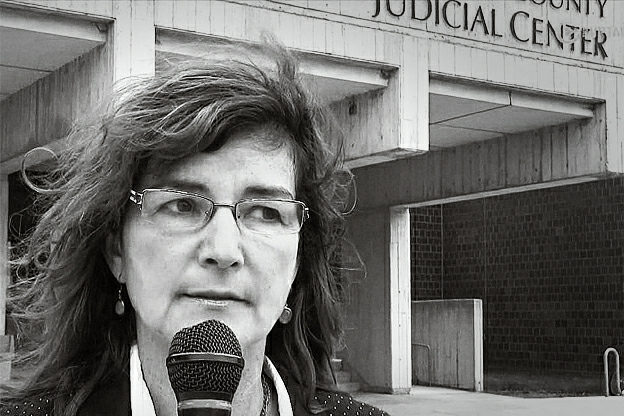

Michelle MacDonald’s loose grip on the law
There is a section on the Star Tribune’s website — a voter guide — where candidates for office can publish a brief statement about themselves. Candidate for the Minnesota Supreme Court, Michelle MacDonald, um, availed herself of the opportunity. Here’s the profile she prepared.
I draw your attention in particular to the endorsements section on page two. MacDonald writes that she had the endorsement of the Republican Party of MN 2014. That’s true as far as it goes, but the endorsement has no currency, of course.
In fact, the Republican Party refused to endorse MacDonald at its 2016 convention, even though MacDonald sought one. It’s a little misleading, don’t you think?
But the real stinker comes a couple of lines down, where MacDonald claims this endorsement: “GOP’s Judicial Selection Committee 2016.”
MacDonald is dreaming here. There was no GOP Judicial Selection Committee. Under the RPM’s constitution in effect at the time of 2016 state convention, there was a “judicial election committee” (referred to in lower case in the constitution); the word “selection” is nowhere mentioned. The purpose of the judicial election committee was simply to act as a screening committee, to make sure that candidates seeking endorsement met the requirements for the office. Its function was definitely not to endorse anybody; that was the convention’s job, a job that the convention declined, as I stated earlier.
The judicial election committee did pass MacDonald on to the entire convention for consideration of an endorsement. But even that was not without controversy. There was a minority report issued by some members of the committee describing why MacDonald was unfit for endorsement.
There are two, well at least two, deceptive claims in MacDonald’s reference to an endorsement from a judicial “selection” committee.
It wasn’t an endorsement; it was just a candidate screen. If there had been ten candidates, and each one met the qualifications for endorsement, the committee presumably would have passed all the names along.
The committee wasn’t selecting anyone for a ribbon, either. MacDonald’s adding the word “selection” to the committee name is misleading, devious even.
As an aside, the Republican Party got so sick of this whole thing that it changed its constitution to require judicial candidates pass through the same nominating committee as candidates for other offices.
o O o
Minnesota law takes truth in endorsements seriously. Here’s Minn. Stat. § 211B.02 (2016), titled False Claim of Support.
A person or candidate may not knowingly make, directly or indirectly, a false claim stating or implying that a candidate or ballot question has the support or endorsement of a major political party or party unit or of an organization. A person or candidate may not state in written campaign material that the candidate or ballot question has the support or endorsement of an individual without first getting written permission from the individual to do so.
To repeat myself, the committee didn’t endorse MacDonald; it didn’t have the power of endorsement. It didn’t even “select” her. The body with the power to endorse, the entire convention, pointedly declined to do so.
Sadly, this whole business is well-trod ground for the Republicans. It provides, though, one of my favorite stories of Republican internecine warfare involving, among others, two Republican activist lawyers, Harry Niska (one of the authors of the minority report linked above, by the way) and Bonn Clayton. The dust up went all the way to the U.S. Supreme Court (although the Supremes declined to hear the case last year).
In the briefest outline, attorney Niska brought a complaint in the Office of Administrative Hearings against attorney Clayton for violating § 211B.02 during the 2012 election cycle by publishing misleading claims that three non-incumbent candidates for the Minnesota Supreme Court had received Republican Party endorsement, when instead they just had the imprimatur of a rump group of crackpots (well, Harry didn’t say that; I just did) called the Judicial District Republican Chairs Committee, which didn’t have the power of party endorsement.
The OAH agreed with Harry, and so did the Minnesota Court of Appeals which took up an appeal by Clayton. In its opinion, it said this:
Clayton’s next argument is that the panel did not receive substantial evidence that he violated section 211B.02. He appears to assert that the ALJ panel erred by concluding that his actions constituted a false endorsement. A person who promotes a candidate by including the initials or the name of a major party without clarifying that the candidate is merely a member of the party violates section 211B.02 if he knows that the candidate is not also endorsed by the party. See In re Ryan, 303 N.W.2d 462, 465-66 (Minn. 1981)(holding that placing the terms “DFL” and “LABOR ENDORSED” on campaign materials violated the statute); Schmitt v. McLaughlin, 275 N.W.2d 587, 591 (Minn. 1979) (finding the use of the initials “DFL” would falsely imply endorsement or support). Clayton used the term “Republican Party of Minnesota” on multiple documents and on his website while promoting candidates who lacked the party’s endorsement. Clayton attended the state Republican convention and knew that the party had not endorsed his preferred candidates. The ALJ panel had ample evidentiary support for its finding that his actions knowingly and falsely implied that the RPM endorsed the candidates.
I probably don’t even need to add that Bonn Clayton is a big fan of Michelle MacDonald. The reverse may also be true, since MacDonald seems to have followed Clayton’s lead in violating the false endorsement statute.
Thanks for your feedback. If we like what you have to say, it may appear in a future post of reader reactions.

